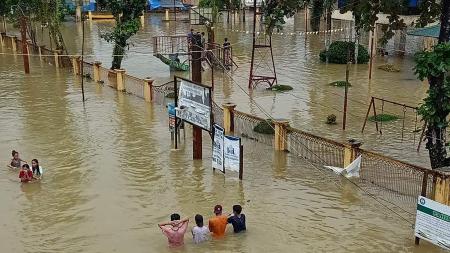At least 27 people died and more than 614,000 were affected by the floods that have been registered in the Philippines since the beginning of the year, according to official data published this Sunday by the Philippine Office of Civil Defense (ODC).
The balance also includes eleven people injured and three missing, while 112,000 people had to leave their homes. by the floods, which mainly affect the islands of Luzon and the archipelagos of Visayas and Mindanao, located in the waters of the Pacific Ocean, reported the AFP news agency.
The authorities of the South Asian country, which covers more than 7,000 islands, declared a state of calamity in at least eight cities and towns, and one province, according to the ODC, quoted by the local television channel ABS-CBN.
Damage to agriculture is estimated at 258.3 million pesos (4.5 million dollars) and damage to infrastructure is estimated at 171 million pesos (3 million dollars).
The death toll from massive flooding across the country caused by inclement weather has risen to 27, the Office of Civil Defense (OCD) said. https://t.co/Cz4hOQzIRe
— teleSUR TV (@teleSURtv) January 15, 2023
The emerging material damages affected 1,281 homes.
The Philippine government has so far mobilized aid worth 31.6 million pesos (5.5 million dollars) for those affected and deployed search and rescue teams, as more heavy rains are anticipated in the country.
The downpours and floods that hit the central and southern islands of the country from Christmas weekend to the present, caused thousands of people to leave their homes. The civil defense updated today, in an official report.
The state meteorological service of the Philippines (Pagasa) warned that rains will continue over the Bicol peninsula and in the province of Quezon, one of the 17 regions of the Philippines, in the extreme southeast of the main island of Luzon and adjacent islands.
The Philippines is considered one of the countries most vulnerable to the impact of climate change, and scientists have warned that storms are becoming more intense as the planet warms.
















